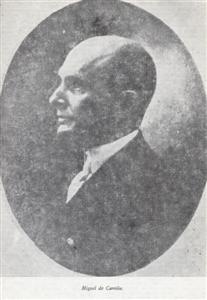4.2.3.1 The novelistic work of Miguel de Carrión (1875 – 1929)

Miguel de Carrión’s first novel was published in 1903 under the title “El Milagro” (The Miracle); in 1917 he published “Las Honradas” (The Honourable Women) and in 1919, “Las Impuras” (The Impure Women), which will be addressed in a separate section; in addition, “La Esfinge” (The Sphinx) was published very posthumously in 1961, and “El Principio de Autoridad” (The Principle of Authority) remained unfinished; its first chapters were published in 1903 in several issues of the magazine “Azul y Rojo” (Blue and Red).
His style, unlike that of other writers of the period, offers consistency in its linguistic approach and also the persistence of common themes throughout his narrative output, not just his novels. Among these, he was interested in ethical considerations and their influence on individual psychology, especially regarding female behavior; he railed against the coercion of natural instincts within the framework of bourgeois morality; although he himself was a representative of this morality from an economic perspective, more so of the well-off middle class.
“The Miracle” is a piece permeated with a lyrical tone that condenses the romantic heritage of the colonial era. In this sense, the author confesses that it was originally conceived as a great poem. Already in it, the anticlericalism that would mark his thought and manifest itself in his later work is expressed, where he also raises the dilemmas arising from the need to satisfy sexual impulses in a restrictive and morally axiomatic environment.
For its part, “The Principle of Authority” approaches the religious topic from another angle, that of the hypocrisy of a false beatitude, which constitutes only a public image atomized by private behavior. This work and “The Miracle” expose, in their own way, the impossibility of Christian moral precepts for achieving individual well-being, the aspiration for happiness, and full fulfillment in love, which was a deeply held sentiment for Carrión.
“The Sphinx” explores another path of femininity. The protagonist, Amanda Jacob, is forced into a marriage devoid of love and desire and, burdened with the weight of all her marital commitments, secretly loves her cousin and cultivates an evocative passion that epitomizes frustration and the inability to achieve personal fulfillment, even at a minimal level, a symbol of the oppression women suffered in their interpersonal relationships.
Miguel de Carrión’s novels reveal a skeptical attitude toward the reality he perceived—for although he did not have a sociological approach, his works demonstrate a profound capacity for observation—and little transformative spirit, but rather a testimonial to a certain extent, a testimony exercised through fiction but with a high degree of verisimilitude. His works, above all, have the merit of having brought the situation of women to the literary forefront, and indirectly of a society capable of causing such distortions between the individual and his supreme aspiration for happiness.








